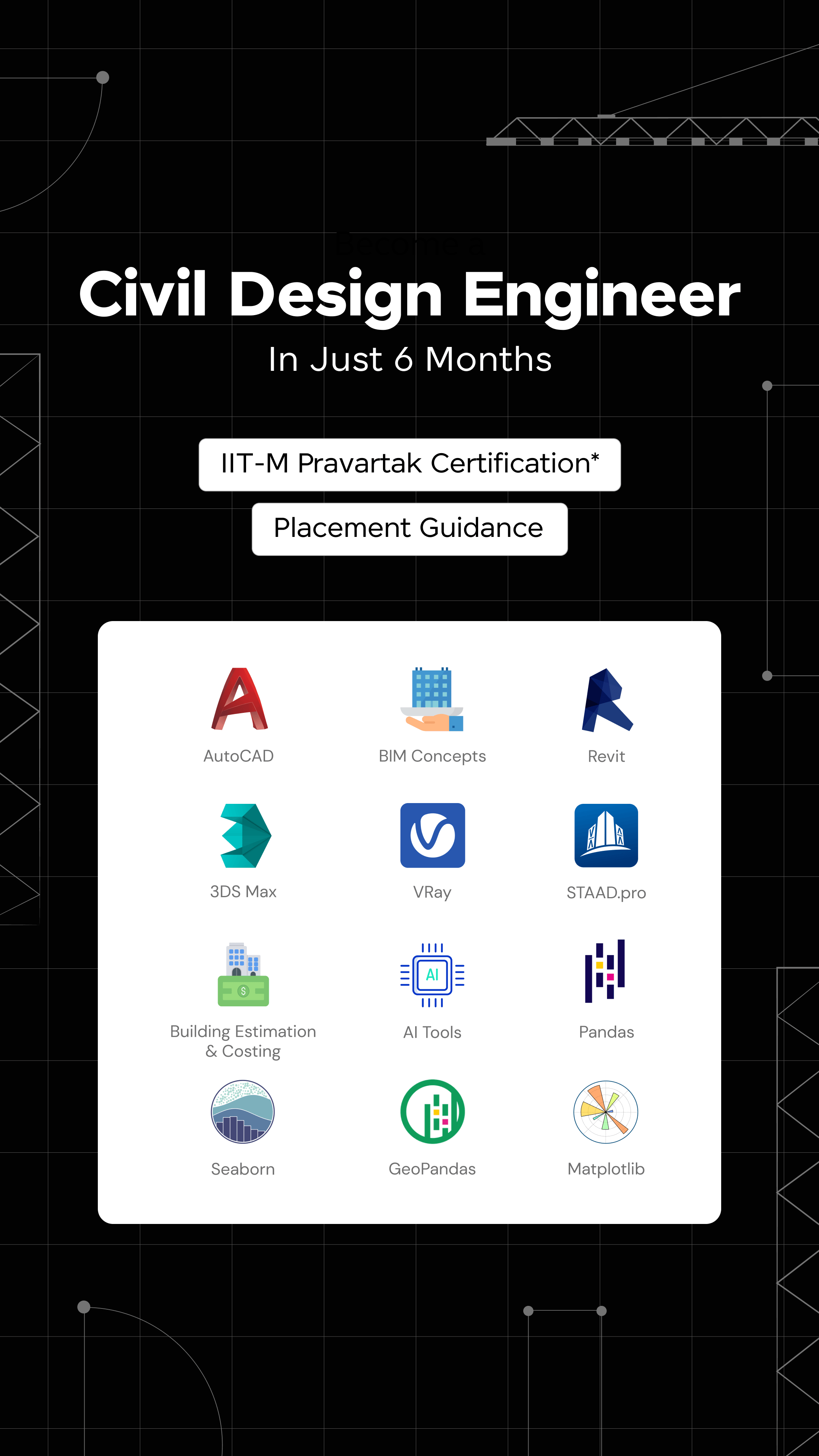
Best Career Opportunities in Civil Engineering in 2025
Apr 30, 2025 6 Min Read 5141 Views
(Last Updated)
In recent decades, technological growth has been so rapid that every kid now dreams of becoming a tech geek. But let’s not forget the importance of other engineering disciplines that laid the foundation for this growth. Take civil engineering, for instance – it plays a major role in constructing the very buildings where technology thrives.
Have you ever thought about the career opportunities in civil engineering? If you’re interested in this field but feel unsure about your future, this blog is for you. We’ve compiled some of the best civil engineering career opportunities that can help you build a strong and fulfilling career.
So, without further ado, let’s get started.
Table of contents
- What is Civil Engineering?
- Career Opportunities in Civil Engineering
- Infrastructure Development
- Construction
- Environmental Engineering
- Geotechnical Engineering
- Structural Engineering
- Transportation Engineering
- Water Resources Engineering
- Consulting and Project Management
- Urban Planning and Smart Cities
- Why Choose Civil Engineering as a Career?
- Conclusion
- FAQ
- What are the career prospects for civil engineers?
- Can civil engineers work internationally?
- What is the role of a consulting civil engineer?
- Are there opportunities for research and development in civil engineering?
- What qualifications are required to become a civil engineer?
- Do civil engineers need field experience?
- Which software tools should civil engineers learn?
What is Civil Engineering?

Before we dig deep into the career opportunities in civil engineering, let us first understand what civil engineering is all about and why it is important to this modern age.
Civil engineering is the backbone of our modern society. It’s the field of engineering that focuses on designing through CAD software, constructing buildings, and maintaining the physical infrastructure we all rely on every day.
Think about the roads you drive on, the buildings you live and work in, the clean water that flows from your taps, and even the bridges that connect cities – all of these are products of civil engineering.
Civil engineers use their knowledge of math, science, and technology to plan and create safe, functional, and sustainable environments for us. Whether it’s designing a new subway system, making sure a skyscraper won’t collapse, or finding ways to manage water resources efficiently, civil engineers are the problem solvers who make it happen.
The role of civil engineers extends beyond construction. Their work includes regular maintenance and upgrades to existing infrastructure, helping it stay efficient and safe over time.
This is why civil engineering career opportunities continue to grow and remain highly relevant in today’s world. It’s a profession that blends technical expertise with creativity to create the physical foundations of our modern lives.
Before we move into the next section, we’d like to ensure you are well-versed in the essentials of civil engineering. To smoothen your learning process, consider enrolling in GUVI’s Civil Engineering Course with Placement Assistance. You’ll gain hands-on knowledge of fundamental tools such as AutoCAD, Revit, 3dsMax, etc, needed for modern civil design.
Additionally, if you want to get started in the field through self-paced learning, try GUVI’s AutoCAD certification course.
Career Opportunities in Civil Engineering
Now that you understand what civil engineers really do, let’s dive into some of the best career opportunities in civil engineering:
1. Infrastructure Development

Among the top career opportunities in civil engineering, infrastructure development plays a crucial role in designing and building essential systems like roads, bridges, airports, water supply, and sewage networks.
Civil engineers in this field ensure that communities have access to reliable and safe public services that form the backbone of modern living. Infrastructure development spans a wide range of projects – from local improvements to massive national and global efforts. Civil engineers can specialize in transportation systems, structural design, or water management based on their interests. The field offers the freedom to work across sectors and locations, including international opportunities, as many countries continue to invest heavily in public infrastructure.
Often seen as one of the most impactful civil engineering career opportunities, this domain provides long-term job security, leadership potential, and the chance to shape how cities function and grow.
2. Construction
Construction is a fundamental aspect of civil engineering that offers a wide range of roles and responsibilities. It involves managing and supervising projects to ensure they are completed safely and on schedule. This field is a major part of the career opportunities in civil engineering, as it transforms design concepts into real-world structures.
As a civil engineer in construction, you might work as a site engineer, overseeing day-to-day operations and ensuring that everything is built according to plans and safety standards. You could also explore project management, where you’re responsible for leading teams, managing budgets, and ensuring timely completion. If materials and innovation interest you, construction materials engineering allows you to work with new techniques that improve quality and sustainability.
One of the most rewarding aspects of construction is its hands-on nature. You get to see your designs come to life, solve on-site challenges, and make decisions that impact the final outcome. With the industry evolving through new technologies and materials, there’s always room for growth and specialization. If you enjoy building, creating, and taking ownership of projects, a career in construction could be both exciting and fulfilling.
3. Environmental Engineering
Environmental engineering is a vital area of civil engineering focused on improving and protecting the environment. Professionals in this field work on issues such as water quality, waste management, pollution control, and sustainable development.
You can specialize in areas like air quality, water resources, or environmental impact assessment. Each path offers the chance to contribute to cleaner ecosystems, safer cities, and more efficient resource use. Many civil engineers in this space collaborate with policymakers and urban developers to design eco-friendly solutions.
If you’re someone who wants to use engineering for a greener future, this path opens up exciting career opportunities in civil engineering, especially as global awareness around sustainability grows.
Also Read: Best Ways to Learn Civil Engineering
4. Geotechnical Engineering
Geotechnical engineering is all about understanding the behavior of soil, rocks, and underground materials that support structures. It plays a key role in ensuring the stability and safety of foundations, roads, tunnels, and dams.
As a geotechnical engineer, you might assess the suitability of soil at a construction site, design foundations, or evaluate risks related to landslides and earthquakes. You could work for government bodies or construction companies or specialize in geotechnical consulting or research.
Among the most technical civil engineering career opportunities, this field is ideal for those who enjoy solving complex underground challenges while directly impacting structural safety.
5. Structural Engineering
Structural engineering is a captivating and essential aspect of civil engineering that revolves around designing structures through AutoCAD software and ensuring the safety and stability of buildings, bridges, and other structures. Think of it as being the architect of the skeleton that holds up the world around us.
Structural engineers design buildings and ensure they can withstand various forces and loads, such as earthquakes and strong winds. Structural engineering offers various career paths. Specializations like earthquake engineering or sustainable design are also possibilities. Your work will involve collaborating with architects, other engineers, and construction teams to turn design concepts into reality. It’s a profession that combines creativity with precision and makes a tangible impact on the world’s infrastructure
Career opportunities in civil engineering as a structural engineer are plentiful and diverse. As a structural engineer, you’ll be involved in creating blueprints for structures that can withstand various forces like gravity, wind, and earthquakes. This field offers both creative and technical depth, making it ideal for detail-oriented problem solvers.
6. Transportation Engineering

Transportation engineering is a dynamic and essential field within civil engineering that focuses on creating safe, efficient, and sustainable transportation systems to keep people and goods moving smoothly. In simpler terms, it’s about making sure we can get from point A to point B as efficiently and safely as possible.
In this list of career opportunities in civil engineering, transportation engineering offers a wide range of exciting paths. As a transportation engineer, you get to tackle real-world challenges like reducing traffic congestion, improving public transit, and enhancing road safety.
This field opens doors to various career options. You can work for government transportation departments, consulting firms, or research institutions. Specializations like traffic engineering or sustainable transportation planning are also possible.
Your work will often involve collaboration with urban planners, environmental specialists, and policymakers to shape the way people move in our cities and regions.
7. Water Resources Engineering

Water resources engineering is a crucial branch of civil engineering that focuses on managing and safeguarding one of our most precious resources: water. It’s all about finding ways to ensure we have clean, reliable, and sustainable water sources for drinking, irrigation, industry, and more.
Water resources engineering in career opportunities in civil engineering offers a wide range of fulfilling paths. Imagine working on projects that involve designing efficient water supply systems for cities, managing flood control measures, or ensuring the responsible use of water in agriculture. As a water resources engineer, you’ll play a pivotal role in addressing pressing challenges like water scarcity and climate change.
In this field, you can work for government agencies responsible for water management, consulting firms specializing in water-related projects, or environmental organizations dedicated to preserving water ecosystems.
Specializations like hydrology (studying water cycles) or wastewater treatment are also possible. Your work will often involve collaborating with experts in fields like environmental science, geology, and public health to find innovative solutions to water-related issues.
8. Consulting and Project Management

Many civil engineers choose to work in consulting or project management, guiding clients through the planning, execution, and delivery of engineering projects. These roles combine technical knowledge with leadership, strategy, and communication.
As a consultant, you may assess project feasibility, offer design insights, or help meet compliance standards. Project managers, on the other hand, oversee timelines, budgets, teams, and risks – often acting as the central point of coordination.
If you’re looking for civil engineering career opportunities that offer variety, responsibility, and growth into leadership roles, this space is a solid choice.
9. Urban Planning and Smart Cities
Urban planning is a growing field within civil engineering that focuses on designing organized, sustainable, and livable spaces for communities. As cities continue to expand, the demand for engineers who can think strategically about land use, zoning, transportation, and housing is rising steadily.
Engineers in this space often work closely with architects, local governments, and policy experts to create environments that balance development with quality of life. With the emergence of smart cities, this role has become even more dynamic, involving the integration of technology into infrastructure planning. This includes energy-efficient buildings, intelligent traffic systems, and digitally connected public services.
For civil engineers interested in blending creativity, long-term planning, and innovation, urban development offers an exciting path. It provides a chance to improve how cities function while contributing directly to the everyday lives of people in meaningful ways.
Why Choose Civil Engineering as a Career?
Now that you’ve explored various career opportunities in civil engineering, what are your reasons for considering this path in the first place?
Does any one of the following reasons click with you?
Impact on Society: Civil engineers play a crucial role in shaping the world around us. They design, build, and maintain the infrastructure that we rely on daily, including roads, bridges, buildings, and water supply systems. This work directly impacts the quality of life for communities and society at large.
Diverse Career Opportunities: Civil engineering offers a wide range of career paths. You can specialize in areas like structural engineering, transportation, environmental engineering, geotechnical engineering, or water resources, depending on your interests and passions. This diversity allows you to find a niche that aligns with your skills and preferences.
Job Security: The demand for civil engineers remains steady, as infrastructure development and maintenance are ongoing needs in society. This stability provides job security, especially in challenging economic times.
Global Opportunities: Civil engineers often have the opportunity to work on projects around the world. This global reach allows for exposure to different cultures, engineering practices, and unique challenges.
Problem Solving: Civil engineers are problem solvers. They tackle complex challenges related to design, construction, and infrastructure management. If you enjoy finding innovative solutions to real-world problems, civil engineering is a great fit.
Innovation and Technology: The field of civil engineering continually evolves with advancements in technology. Engineers use cutting-edge software, materials, and construction techniques to improve efficiency and sustainability.
Career Advancement: Civil engineers can advance in their careers by gaining experience, pursuing further education, or specializing in a specific area. Many engineers move into leadership, project management, or even entrepreneurship.
Sustainability: There’s a growing emphasis on sustainable infrastructure development, making this an exciting field for those interested in environmental conservation and green engineering practices.
Creativity: Civil engineering combines science and art. Engineers get to be creative in their designs while ensuring structural integrity and safety.
Financial Reward: Civil engineering can be financially rewarding, particularly as you gain experience and expertise in specialized areas.
To summarize, civil engineering can be a rewarding career for you, one that offers a chance to positively impact society while working towards building a long-lasting, utility-driven, and a sustainable infrastructure, all at the same time.
Kickstart your Civil engineering journey by enrolling in GUVI’s CAD Building Design and Analysis Course and become skilled in key concepts such as 2D and 3D design, 3D modeling, Structural Analysis, and much more. Build real-life projects with industrial mentorship, plus an IITM-Pravartak and Autodesk certification that’ll make your portfolio stand out!
Also, if you wish to explore through a self-paced learning mode, try GUVI’s AutoCAD Civil Course
Conclusion
The field of civil engineering offers a promising scope where you can help build and improve the world around you. From designing complex structures to managing environmental concerns, there’s a place for every kind of problem solver.
If you’re drawn to a career that blends creativity, real-world impact, and technical expertise, this could be the right path for you. The career opportunities in civil engineering are not only varied but also meaningful- giving you the chance to contribute to infrastructure, sustainability, and community development.
With the right skills, training, and mindset, civil engineering can lead to a fulfilling and future-ready profession.
FAQ
Civil engineers have diverse career opportunities in areas like structural engineering, transportation, environmental engineering, project management, and more.
Yes, civil engineers often have the opportunity to work on projects around the world, especially in regions with growing infrastructure needs.
Consulting civil engineers provide expert advice to clients on various engineering projects, helping them make informed decisions and navigate complex challenges.
Yes, civil engineers can engage in R&D activities to develop innovative solutions, materials, and technologies for the field.
Typically, a bachelor’s degree in civil engineering or a related field is required, followed by obtaining a professional engineering license, which varies by region.
Yes, practical exposure through internships or site work helps work on real-world applications and builds confidence in applying theoretical knowledge.
Learning tools like AutoCAD, Revit, and STAAD.Pro and Primavera can improve your efficiency and open doors to specialized roles in design and project management.





























![How to Switch from Sales to Digital Marketing: A Beginner's Guide [2025] 13 sales to digital marketing](https://www.guvi.in/blog/wp-content/uploads/2025/01/How-to-switch-your-career-from-Sales-to-Digital-Marketing.png)

Did you enjoy this article?